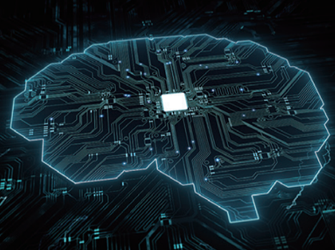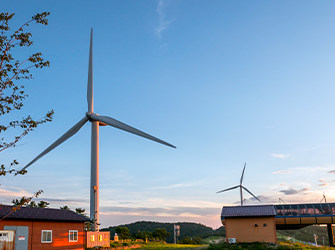eng_sub_left
Development of innovative AI/computer advanced technology applicable to the energy field.
The KENTECH Institute for Energy AI aims to develop novel and practical breakthrough technologies in the field of computer science (CS) and AI. Core research areas include artificial intelligence, machine learning, computer vision, NLP (Natural Language Processing). theory and algorithms, mobile computing, cyber-security, IoT, and computer systems. Recent technology advances in ICT, especially in AI, finds their applications in a wide range of fields such as healthcare, financing, manufacturing, mobility, education, agriculture, and energy systems. Even though the KENTECH Institute for Energy AI covers all application areas, we are especially interested in Cs and AI applications to new energy systems towards the carbon neutral era.
The KENTECH Institute for Energy AI provides comfortable research environments. Active research collaborations, internal and external, are strongly encouraged. We guarantee equal opportunity regardless of gender, color, and creed. We promote multicultural work environment.
People
| Position | Name | Tel / e-mail | Research highlights | Homepage |
|---|---|---|---|---|
| Director/Distinguished Professor | Chongkwon Kim |
061-330-9654 ckim@kentech.ac.kr |
Machine Learning (DRL, GNN), SNA, Recommender System, IoT | |
| Assistant Professor | Seokju Lee | slee@kentech.ac.kr | Computer Vision & Robot Intelligence | 홈페이지 바로가기 |
| Professor | Hyuk Lim |
061-320-9603 hlim@kentech.ac.kr |
Sustainable AI, Cyber Security, Data Networking | 홈페이지 바로가기 |
| Associate Professor | Youngtae Noh |
061-320-9603 ytnoh@kentech.ac.kr |
Intelligent Mobile Computing | 홈페이지 바로가기 |
| Assistant Professor | Hyunwoo Lee |
061-320-9603 hwlee@kentech.ac.kr |
Network Security, Protocol Verification, Applied Cryptography, AI for Security | 홈페이지 바로가기 |
Research
The institute’s mission is to become a world leader in innovative research. To achieve this, we conduct pure research in CS and AI. Core research areas include theoretical machine learning, computer vision, mobile computing, cyber-security, IoT, algorithm, and computer systems. In addition to pure research, we emphasize applications of CS and AI to energy systems to transform the energy landscape. Close collaborations with diverse organizations and diligent technology transfers are strongly encouraged. We offer an international, multicultural work environment. Our research areas include:
Machine Learning
Self-supervised learning, transfer learning, meta learning, generative and discriminative modeling, graph neural networks, representation learning, and explainable AI
Deep Reinforcement Learning
Multi-agent reinforcement learning, hierarchical reinforcement learning, policy gradient methods, planning and learning, efficient and stable training, scalability, imitation learning, applications to optimal control systems (Energy Systems)
Computer Vision, NLP
Pre-training, transformer, word embedding, time-series analysis, super resolution, image enhancement, feature extraction, and pose estimation
Data Analytics
Recommender systems, text mining, graph mining, social network analysis, and visualization
HCI, Mobile Computing
Activity modeling and recognition, sensing (acoustic, RF), UI/UX, AR/VR, emotional and mental wellbeing, localization, tracking, wearable computing, human mobility, and gesture recognition
CPS
IoT, cyber security (system, network), energy-efficient protocols, digital twin, real-time systems, distributed systems, and applications

Computer Science(Base)
-
Computer system
-
HCI/UX/AR
-
Networking & Security

Machine Learcing/AI (Algorithm)
-
Large scale DRL
-
Date constrained ML
-
GNN, Temporal Data Analysis

Data Science and Analytics
-
Data Acquisition
-
Data Storage/Processing
-
Data mining

Energy Applications
-
Energy
-
Infrastructure
-
City
Computer Science
Computer science (CS) is the study of data, information, and computation. The CS area includes a wide spectrum of theoretical disciplines (such as algorithms, computation theories, and information theories) and practical disciplines (such as hardware and software development). The theoretical CS covers theory of computation, information and coding theory, data structures and algorithms, and programming languages theory and formal methods. Computer systems and computational processes span artificial intelligence (AI), computer architecture and organization, distributed and cloud computing, computer networks, computer security and cryptography, databases and data mining, computer graphics and visualization, and multimedia processing.
Machine learning (ML), which is seen as a part of artificial intelligence (AI), is the study of computer algorithms that can improve automatically through experience and by the use of data. Machine learning algorithms build models based on sample data, called training data, to make predictions or decisions without explicitly programming them. Approaches of machine learning are traditionally divided into three broad categories: supervised learning which requires example inputs and their desired outputs, unsupervised learning where no labels are given for training, and reinforcement learning that encourages a model to interact with a dynamic environment for a certain goal. Machine learning algorithms are used in a wide variety of applications, such as in recommender systems, computer vision, speech recognition, autonomous driving, medical imaging, and so on.
Data science is an interdisciplinary to extract knowledge and insights from noisy, structured and unstructured data by using scientific methods, processes, algorithms and systems. Data science is related to big data, statistical analysis, data mining, machine learning, and deep learning. Human–computer interaction (HCI) is research in the design and the use of computer technology, which focuses on the interfaces between people (users) and computers (also include mobile and wearable devices). HCI researchers observe the ways humans interact with computers and design technologies that allow humans to interact with them in novel ways. HCI is also related to mobile computing, UI/UX, AR/VR, emotional and mental wellbeing, wearable computing, gesture recognition, and so on.
Energy Applications
CS and AI will play a very important role in accomplishing the carbon neutral era. To realize the carbon neutral society by the year 2050, we must transform the current energy system that is based on mixed energy resources to a new system based on electrification. Carbon-less electrification requires huge investment on renewable energy resources such as PV, EV and hydrogen. CS techniques such as IoT and CPS enable real time sensing and control of large scale energy systems. In addition, recent investigations claim that AI techniques such as deep learning, reinforcement learning, time-series analysis, graphical neural networks, and computer vision effectively improve the performance of energy systems. At the KENTECH Institute for Energy, students will investigate the most efficient ways to apply CS and AI techniques to energy systems. Research topics include, but are not limited to, PV generation prediction and weather/demand forecasting, intelligent EV management, optimal control of VPP and sector coupling based on deep reinforcement learning.

